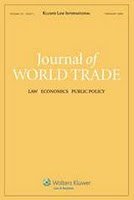7 May 2012
Journal Articles
Karapinar, Baris
Export restrictions and the WTO law: How to reform the ‘Regulatory Deficiency’

Authored by Baris Karapinar, in "Journal of World Trade, 2011, 45(6), 1139–1155".
Trade barriers in the form of export restrictions imposed on various food products and natural resources have been subject to extensive public attention. A notable illustration of the growing importance of export restrictions was the establishment of a panel by the World Trade Organization (WTO) Dispute Settlement Body (DSB) in December 2009 to examine complaints brought by the United States, the European Union (EU), and Mexico concerning China's export restriction policies. While export restrictions undermine the stability of the multilateral trading system by distorting global markets, the WTO law regulating this field arguably represents a case of 'under-regulation' or 'regulatory deficiency'. Hence, stricter WTO regulation in this area of apparently large 'policy space' is needed. However, various reform proposals submitted to the WTO face strong opposition mainly from developing countries. In this context, this article attempts to illustrate how a sufficiently 'differentiated' reform agenda on export restrictions could help maintain the stability of the multilateral trading system while addressing the legitimate concerns of developing countries.<//span><//span>
Export restrictions and the WTO law: How to reform the ‘Regulatory Deficiency’
Further info
More information

